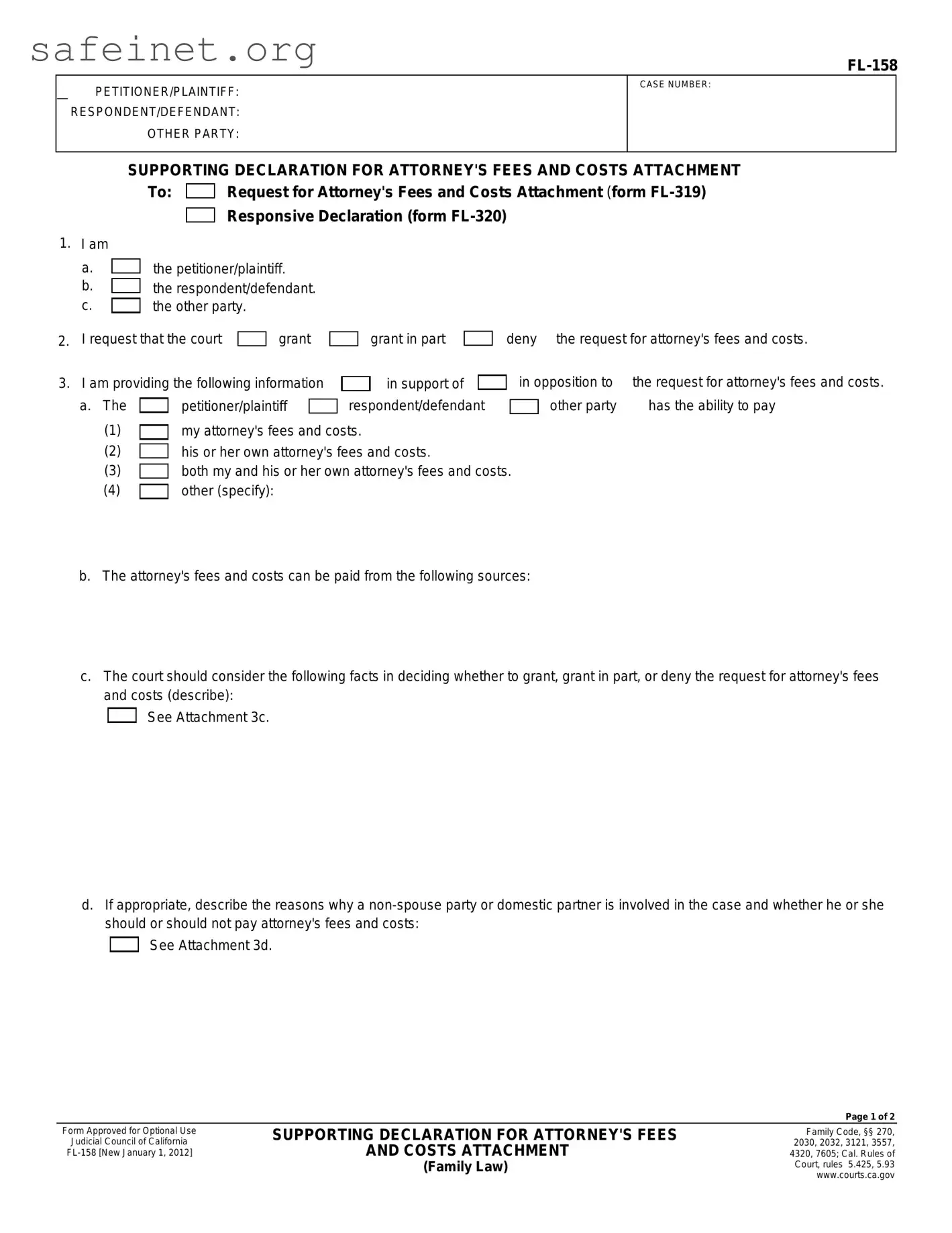The FL-158 form, known as the Supporting Declaration for Attorney's Fees and Costs Attachment, is utilized in family law cases to support a request for attorney's fees. A similar document is the FL-319, which is also a Request for Attorney's Fees and Costs Attachment. The FL-319 allows a party to request attorney’s fees from the other party, detailing their own financial situation and the time needed for representation. Both forms require a clear articulation of financial needs, ensuring the court has a complete understanding of the circumstances surrounding the fee requests.
The FL-320, or Responsive Declaration, is another document that shares similarities with FL-158. This form allows the recipient of a fee request to respond formally, stating their position regarding the fees sought. Much like FL-158, FL-320 requires the user to provide factual information that supports their argument, either in favor of or against awarding fees. Thus, both forms work in tandem, facilitating communication between opposing parties in family law disputes.
The FL-150, or Income and Expense Declaration, plays a crucial role similar to that of the FL-158. This form provides a detailed overview of a party’s financial situation, including income, expenses, and any other relevant data necessary for determining the appropriateness of attorney's fees. Accurate financial disclosure is essential for both forms, as they seek to present a clear picture to the court regarding a party's capability to pay or receive fees.
The FL-157, known as the Spousal or Partner Support Declaration Attachment, relates closely to the FL-158 in cases involving spousal support. This form outlines factors that the court must consider when determining spousal support, which can be tied to requests for attorney’s fees as well. Both FL-158 and FL-157 require an understanding of the financial dynamics between spouses, ensuring courts make informed decisions that reflect fair support obligations.
The FL-270 is another document pertinent to spousal or partner support within family law. It addresses the request for spousal support directly, allowing parties to present their positions. Like FL-158, it dives into financial details. This similarity ensures that the financial implications of support and attorney’s fees are thoroughly examined in the context of a legal dispute.
The FL-385, which deals with Application for Order for Child Support, aligns closely with FL-158 when discussing financial obligations. Child support significantly impacts the overall financial landscape of both parties. Similar to FL-158, the FL-385 allows for a detailed explanation of financial positions and how support obligations influence other requests, such as attorney's fees.
The FL-210 form, or Declaration Under Uniform Child Custody Jurisdiction and Enforcement Act (UCCJEA), can offer insights parallel to those found in FL-158. While primarily focused on custody issues, it also touches on financial factors that may affect a party’s ability to cover costs, including attorney's fees. The complexity of custody battles often reveals overlapping financial obligations, making the context within FL-210 relevant for discussions about legal fees.
The FL-178, or Declaration for Default or Uncontested Dissolution of Marriage, has a shared purpose with the FL-158 in settling fee disputes within uncontested divorce settings. It summarizes the case’s financial aspects, including any agreements regarding attorney's fees. A clear understanding of the financial landscape can streamline processes, allowing the court to quickly adjudicate requests for fees.
Lastly, the FL-300, Petition for Dissolution of Marriage, also relates to costs and fees, although it directly initiates divorce proceedings. Yet, the financial disclosures made in this form inform discussions about attorney’s fees outlined in FL-158. Understanding the entire context of the divorce, from the outset, showcases why comprehensive forms like FL-300 can provide valuable information relevant to fee determinations later on.


 Request for Attorney's Fees and Costs Attachment
Request for Attorney's Fees and Costs Attachment 


 other
other  See Attachment 3d.
See Attachment 3d.



 No.
No. No.
No.